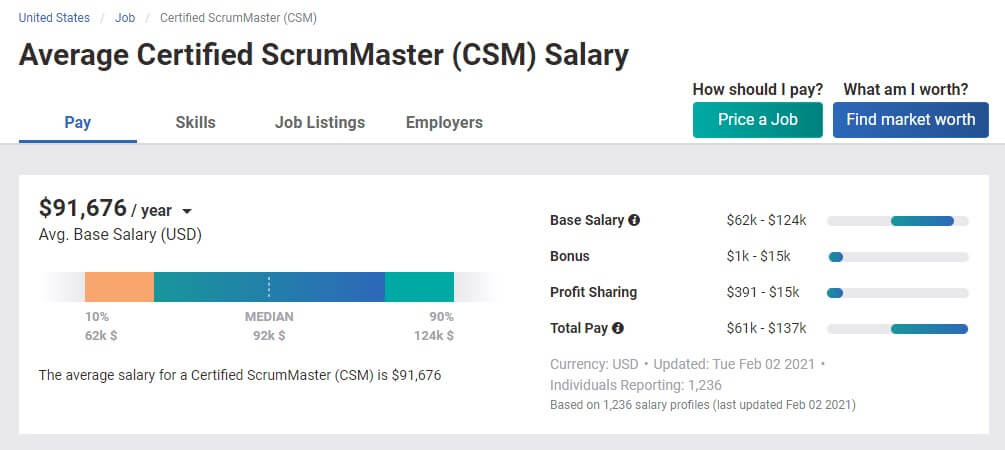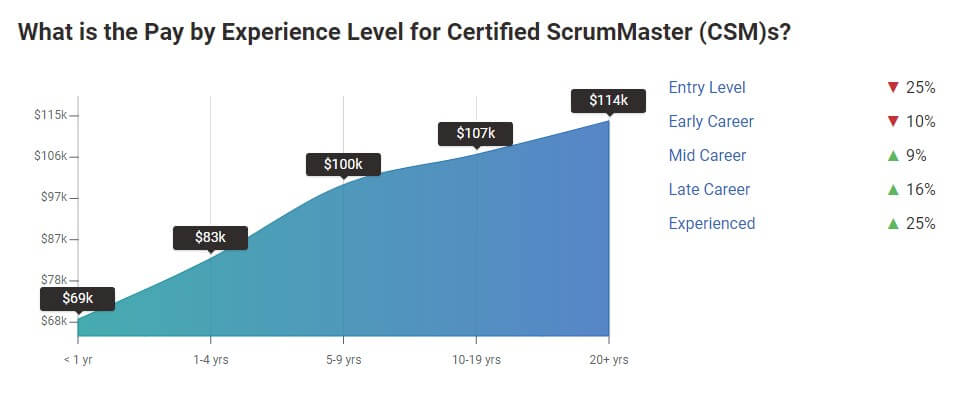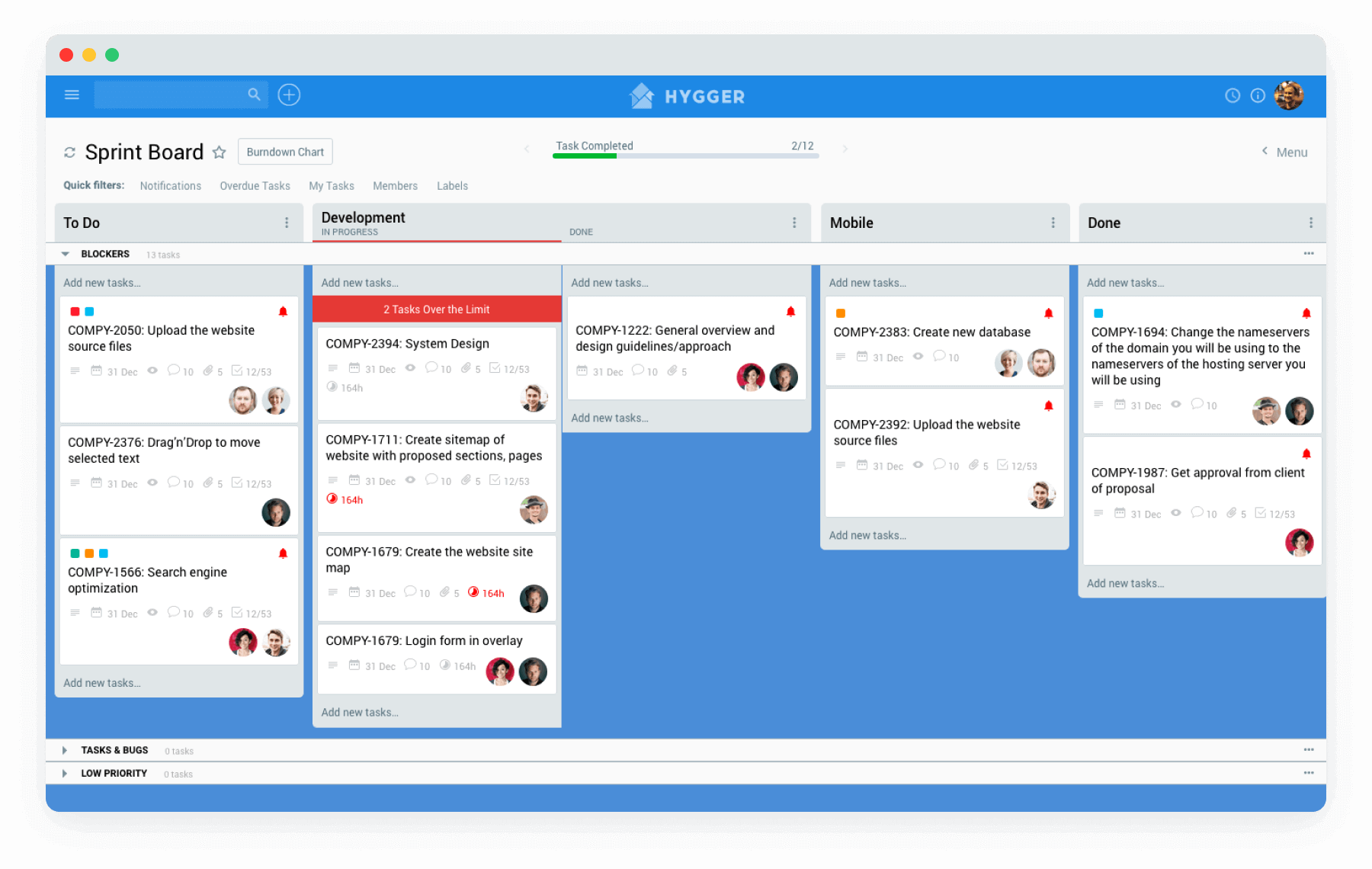Scrum Master
What should we know about this key Scrum role for project success?
Browse topics
Scrum is a set of principles that has been successfully adopted by many organizations of different sizes, particularly by those focused on software development.
Scrum suits professionals who cooperate in an Agile manner to effectively solve problems appearing while they work on tasks. These professionals are led by a Scrum Master, who helps team members to understand Scrum principles, develop the product, and remain Agile in their duties.
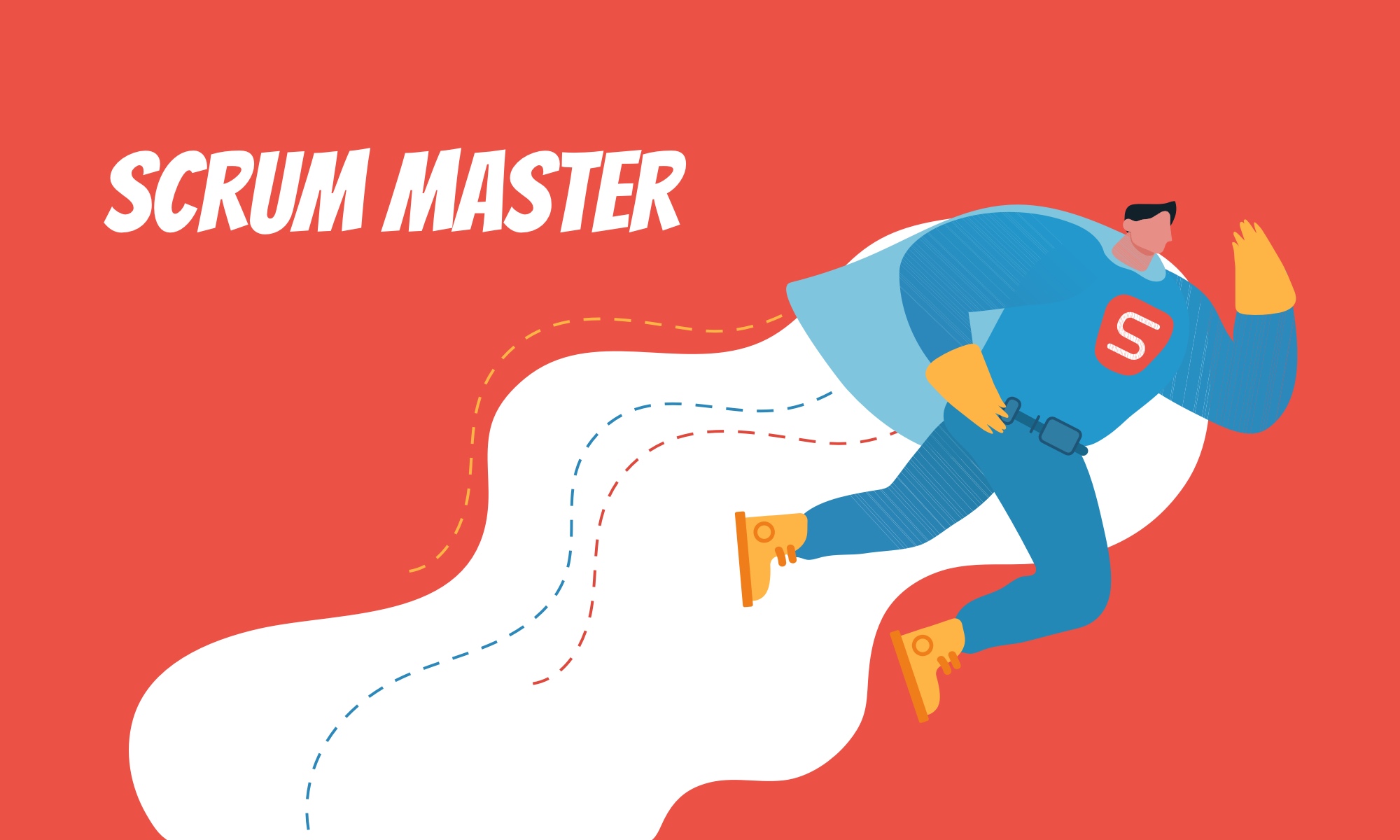
Not Everyone Understands the Value of a Scrum Master
If you’ve chosen the way to Agile transformation (for example, from a Waterfall style of working to Scrum), you’ll soon know that some roles map more easily than others. Stakeholders can play the role of Product Owner, while developers may fit easily into the roles of Scrum team members. However, the Scrum Master role looks more nuanced.
This is not a project manager role, although this is a common misconception. If you’re a newcomer and have a project management background, you may struggle with the idea of stepping back to let the team help themselves.
Sometimes organizations do not fully understand the value of a Scrum Master. Often, decision-makers try to combine it with another position, as they are skeptical that it should exist as a full-time position.
Great Time to be a Scrum Master! 
Reviews and statistics show that Scrum Masters have great opportunities today. More and more businesses are turning to Agile to meet the tough competition they are facing today.
Do not think that getting a great Scrum Master job is as easy as getting a certificate and coming to the interview. Anyways, it all depends on your efforts, skills, and experience.
So, what is this role exactly about? Is Scrum Master a good career? Is it a stressful job? What will you do every day? Let’s cover these questions (and many others) starting with the basics. Here and now.
What is a Scrum Master? 
A Scrum Master is a facilitator of Scrum who acts as a servant leader aiming to drive the delivery in terms of process and product.
Scrum masters act as coaches to the rest of the team. They are committed to the Scrum values but stay flexible and open to opportunities for improving the team’s workflow. They are responsible for promoting and supporting Scrum and do this by helping the team and the management understand the rules, practices, and values of the Scrum methodology.
What Are the Key Skills for a Scrum Master?
When it comes to being an efficient Scrum Master, there are certain skills that will be helpful for succeeding in the role. Here are some of these skills:
- Scrum Masters facilitate important Scrum ceremonies: Daily Scrum, Sprint Planning, Sprint Review or Demo, and Retrospective meeting.
- They influence conflict resolution and communication, focusing on Scrum values of openness, respect, and honesty.
- They should be good experts in planning and estimation. They know how to generate reliable and practical plans for software development projects.
- They should be friendly and communicative. When the team is moving fast in Agile, communication is the key force that holds the team together.
- They help colleagues to clarify goals and actions to achieve them.
- They forecast the number of deliverables possible in an iteration.
- They should act as coaches in Agile practices, teaching individuals and interacting over processes and tools.
- They should be able to shield their team from outside distractions.
- They track and remove impediments.
- Scrum Masters serve their team members before considering themselves.
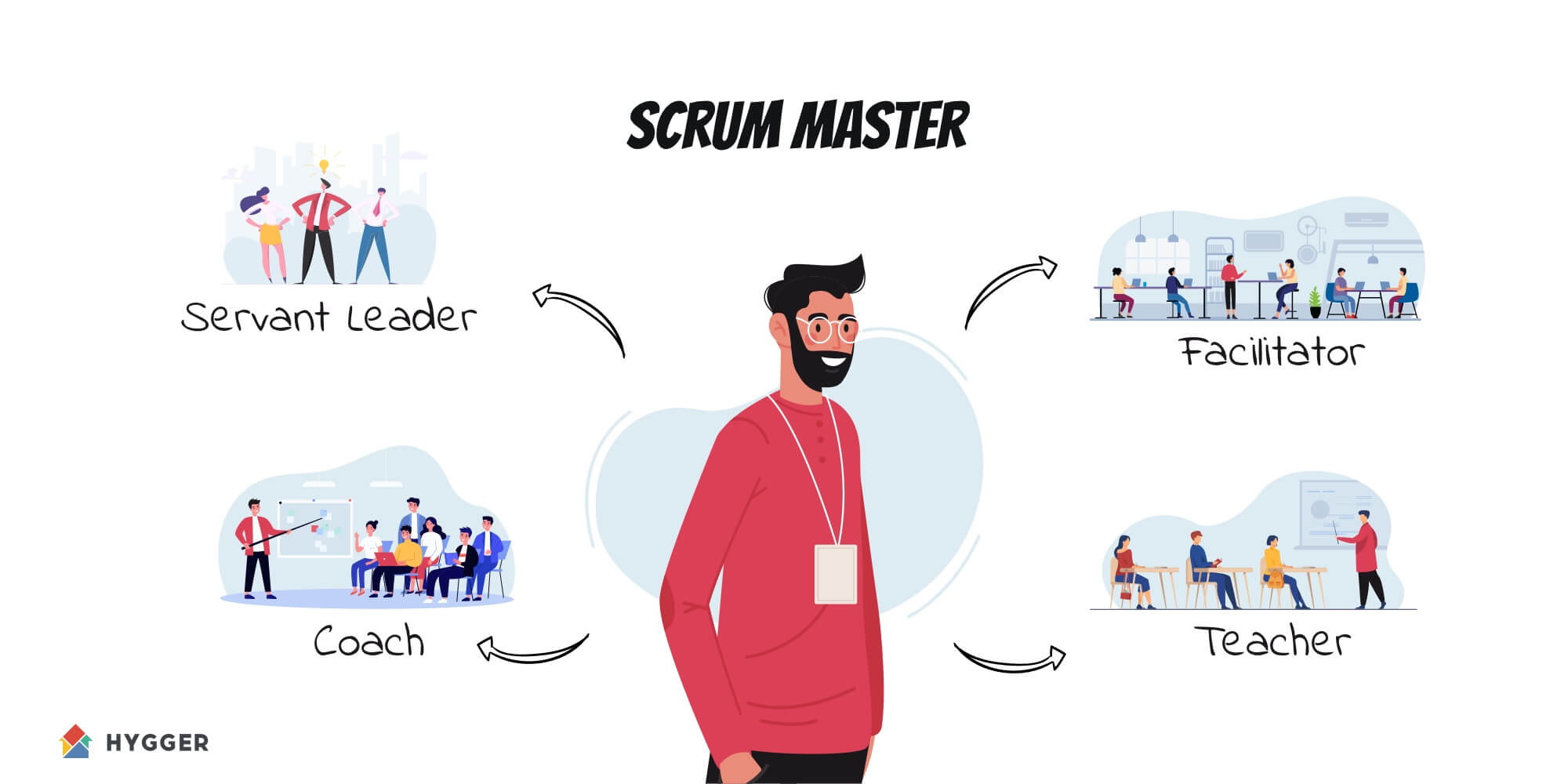
What Are the Scrum Master’s Responsibilities and Duties?
What does a Scrum Master do? He or she should be able to:
- Manage the entire Scrum process with the coordination of the Scrum team in Agile methodology.
- Find ways to increase the creativity of his or her team, trying to boost the overall efficiency of the development team.
- Initiate and run Daily Sand-ups, facilitate and schedule meetings, demo, and decision-making processes to ensure a quick inspection and proper use of the adaptation process.
- Remove all possible impediments for the Agile Scrum team.
- Help PO in keeping the product backlog in good shape.
- Facilitate a Sprint Planning meeting.
- Conduct effective Retrospectives.
- Act as a safeguard for the entire team.
What Are the Technical Characteristics Required for Agile Scrum Masters?
- Knowledge of the Agile-family methodologies.
- Strong knowledge of Scrum theory and practices.
- Ability to coach the team on how to follow the Scrum framework.
- Understanding the fundamentals of iterative and incremental development.
- Basic knowledge of software development processes and procedures.
- Ability to explain other methodologies to motivate the team.
- Understanding the Agile techniques like continuous integration, user stories, continuous testing, pairing, automated testing, etc.
- Commitment to deliver the product on time.
- Understanding the value of metrics and incremental delivery.
- Knowledge about tasks, backlog tracking, burndown metrics, velocity, etc.
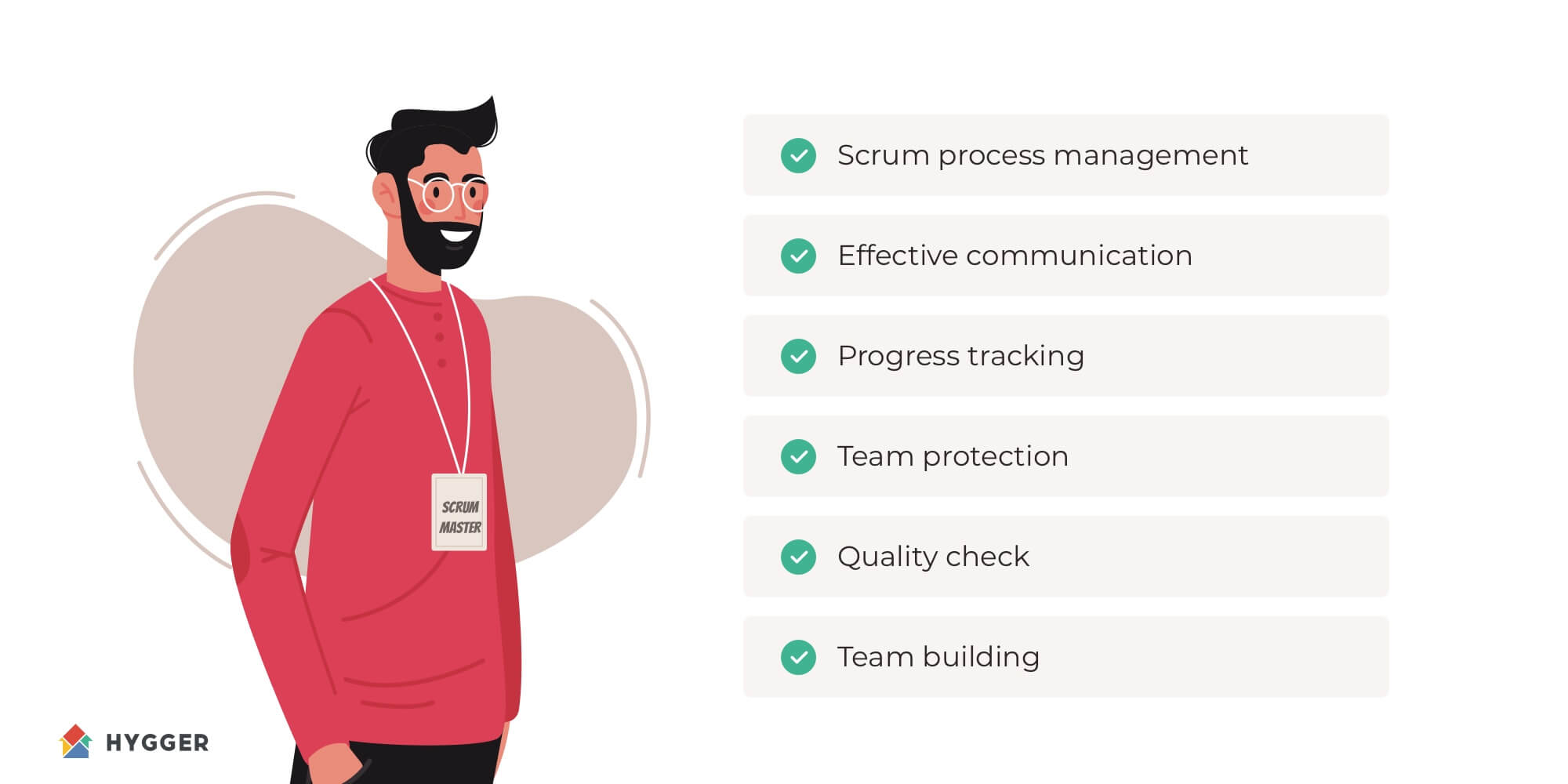
What Are the Personal Characteristics Required for Scrum Masters?
- To be a professional in the workplace.
- To be an open-minded, caring, and communicative person.
- To have the necessary social skills to interact efficiently with peers and customers.
- To be a selfless individual who can motivate colleagues.
- To be honest and punctual.
- To be a well-rounded person.
- To be a natural servant leader and team player with the ability to coach others.
- To be an organized person with expertise in estimation and planning.
What About Scrum Master’s Experience and Education?
Hiring a Scrum leader, many companies expect to find a candidate who has:
- 5-year experience of working with Agile and Scrum in successful projects.
- Highly developed skills in coaching Scrum teams.
- Planning experience.
- Product knowledge and discipline in its practical use.
- Experience in administering Burndown technologies and Retrospective formats.
- Experience in handling bugs.
- Formal and informal education in the Agile methodology.
- Qualification as a Scrum Master.
- Understanding of the rules and practices of other Agile approaches (for example, Kanban vs. Scrum).
- Above-average knowledge of technical matters in software development.
Scrum Master vs. Product Manager
The more a product manager is involved with the development team, the better. His or her involvement should be connected with advocating customer needs and the “Why” of the product. When it all blurs into tasking and the “How” for a team, then there will be a problem.
This kind of utilization mindset usually relates to such problems as defects and unknowns. That’s why the Product Owner and the Scrum Master fill two different needs on a Scrum team which are usually combined with traditional software management.
When roadblocks or changes arise, a clear division between process management and product direction is required. Scrum Masters help to balance the cost of changing courses with the benefits of efficiency.
They do this by empowering the team to decide how to reach their goals through self-organization.
Scrum Master vs. Project Manager
A project manager is the non-technical counterpart of a Scrum Master role. They both are focused on the “How” and solve workflow problems through facilitation.
Though both of them are responsible for helping their teams achieve work goals, their approaches differ.
Project managers set and track timeframes and milestones. They report on progress and coordinate team communication. A Scrum Master assists teams to streamline the processes by which they achieve their goals. They do so by remaining team members, without demonstrating subordination and control.

What Are the Authorities of the Scrum Master role?
Often the role of the Scrum Master can be challenging to understand. Companies may find it hard to describe the benefits of this position. The Scrum Master role is more than just facilitating the development team! It is much more complex and, considering all the responsibilities, the job should be full-time. This role can be truly considered a management position.
However, there is not everything from a traditional management role here, as Scrum Masters don’t manage people, KPI’s, results, or products. They manage the Scrum framework itself.
Keeping in mind this mandate, we can define particular things a Scrum Master might do with these authorities:
- Conducting process interventions
- Resolving Impediments
- Coaching and training people
- Servant-leadership
What Are the Top-3 Skills of the Efficient Scrum Master?
- Agile expertizing. Successful Scrum Masters can provide strong expertise in Agility. They’ve mastered the Scrum framework, and also have enough skills in other Agile methodologies. They can easily mentor, coach, and facilitate other people in adopting Agile values.
- Coach-consulting. Effective Scrum Masters act as coaches for developers, the PO the whole company. They ask powerful questions, hereby changing peoples’ mindsets and behaviors. They offer advice, share practices and provide support for organizations regarding Agile governance.
- Servant-leading. A Scrum Master is a servant-leader who leads the way by showing the behavior necessary to make the change happen.

Who Needs a Scrum Master?
Your logical question may sound like “Do I need a Scrum Master?”
Companies that follow Agile and aim for a team-centric process with a bottom-up management style benefit from having a Scrum Master role. In software development, such teams often exist at the beginning of the technology value stream. This happens because the development work nature usually requires a high degree of collaboration and flexibility. The Scrum Master strives to keep the team’s development effort focused while ensuring the team remains adaptable.
Today more and more teams find that having a designated Scrum manager is helpful to streamline processes. Scrum Masters are also sometimes hired as consultants.
Scrum Master Salary 
This point is too important to forget to consider. Of course, Scrum Master’s salary depends on many factors, such as the level of organization and professional training, as well as work experience. For example, here’s how payscale.com evaluates it:
What Are the Typical Career Opportunities for Scrum Masters? 
Often, after working as a Scrum Master, many professionals strive to seek out other roles on Agile Scrum teams. What are the options?
Certified Scrum Master
One of the most logical ways for a Scrum Master’s career is to earn certification to become a certified Scrum Master. A certified SM plays many of the same roles as a Scrum Master. For example, he or she leads the team of product developers and ensures the team collaborates and follows the Agile approach. Certified professionals facilitate Daily Scrum meetings, Sprint reviews, and Sprint retrospectives. They work with other team leads to set project goals and monitor progress to see if these goals will be met.
Agile Coach
Scrum Masters who want to move to the next level (meaning leading the team) may consider becoming an Agile coach. This person creates a team with software developers to use Agile practices in their work. He/she assists the team to apply these practices to specific difficulties they might face. Agile coaches must be very skilled at what they do in terms of software development and coding as well as be ready to cooperate with a team in applying Agile principles.
Product Owner
In case a Scrum leader invests in a particular product a software team is creating, he/she may wish to consider a role as Product Owner. This role is akin to the project manager of a team developing a specific piece of software. Product Owners interact with clients who have asked for the product to be developed. They also lead developers to ensure the client’s goals are met. Additionally, POs identify the backlog with the tasks to be completed and prioritize those items.
Conclusion
Why Is Scrum Master Important?
The Scrum Master role is critical and needs to be handled with care. This popular position has a high degree of accountability and responsibility towards the team, processes, and the company that not only requires an open mindset but also a concern for the wellbeing of team members.
The Scrum Master can build awesome high-performing teams that sustain hardships and draw learning out of every experience.
Do you want to be a Scrum manager? Is Scrum Master a good career? Are you ready for these tons of responsibilities? Remember that having the right tools to facilitate the Scrum process is key to any Scrum Master’s success. This is exactly the moment when we can remind you about the benefits of Hygger for Scrum-oriented teams.
Hygger is a trendy project management software that can easily work with the self-organizing teams and various tasks of a Scrum framework. Do not doubt and become a successful Scrum Master with Hygger!

